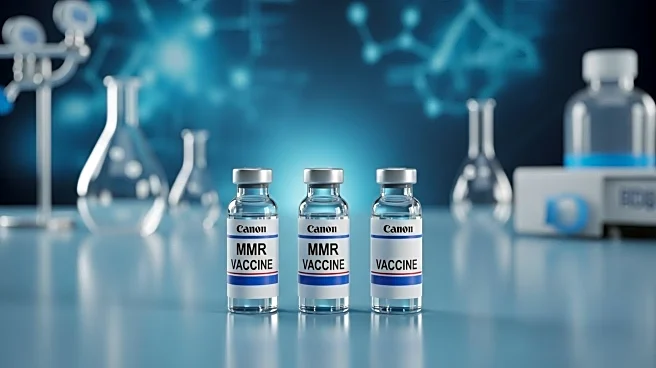What is the story about?
What's Happening?
Jim O’Neill, the acting director of the Centers for Disease Control and Prevention (CDC), has suggested that the MMR vaccine, which protects against measles, mumps, and rubella, should be split into three separate shots. This proposal aligns with comments made by President Trump on his Truth Social platform, advocating for monovalent vaccines to replace the combined MMR shot. O’Neill, who lacks a medical or scientific background, has faced scrutiny for his stance, which contradicts his previous support for vaccinations. The suggestion has been met with criticism from vaccine experts, including Dr. Paul Offit, who argues that splitting the vaccine would increase costs and require more doses, potentially leaving children vulnerable to diseases. The proposal also faces logistical challenges, as individual vaccines for measles, mumps, and rubella are not available in the U.S.
Why It's Important?
The proposal to split the MMR vaccine has significant implications for public health policy and vaccine accessibility in the U.S. Critics argue that separating the vaccine into three shots could lead to increased healthcare costs and logistical challenges, potentially resulting in lower vaccination rates and increased vulnerability to preventable diseases. The suggestion also reflects ongoing debates about vaccine safety and efficacy, influenced by anti-vaccine rhetoric. If implemented, this change could affect vaccine manufacturers like Merck and GSK, who currently produce the combined MMR vaccine. The controversy highlights the tension between scientific evidence and political influence in shaping public health decisions.
What's Next?
The proposal is likely to face resistance from vaccine manufacturers and public health experts, who may advocate for maintaining the current combined MMR vaccine. The CDC's Advisory Committee on Immunization Practices (ACIP) may review the suggestion, considering the potential impact on vaccination rates and public health outcomes. Stakeholders, including healthcare providers and advocacy groups, are expected to voice their concerns, emphasizing the importance of evidence-based vaccine policies. The debate may also influence future discussions on vaccine development and distribution, as well as public trust in health agencies.
Beyond the Headlines
The proposal to split the MMR vaccine raises broader questions about the role of political influence in public health decisions. It underscores the challenges of balancing scientific evidence with political agendas, particularly in the context of vaccine safety and accessibility. The controversy may contribute to ongoing discussions about the credibility of health agencies and the importance of maintaining public trust in vaccination programs. Additionally, it highlights the need for clear communication and transparency in health policy decisions to ensure informed public discourse.















